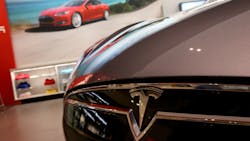Tesla Effect Boosts Shares of Little-Known Lithium Salt Supplier
When Elon Musk last May announced he was speeding up his grand plan to produce 500,000 electric cars per year, shares of a little-known Osaka-based chemical maker jumped more than 33% in four days.
One of the world’s few producers of the ultra-pure lithium salts used in high-end batteries, Stella Chemifa Corp.’s shares more than doubled in the last two years as Tesla Inc.’s ambitions grew and China tried to cut its greenhouse emissions with plans to put millions of cars on the road that use little or no gasoline.
“Right now there’s an imbalance between supply and demand,” Stella’s 43-year-old president, Aki Hashimoto, said in an interview at the headquarters of the company her great-grandfather started 101 years ago. “We’re working really hard to meet the needs of our customers.”
Buried deep in the electric vehicle supply chain, Stella produces a crystalline white powder called lithium hexafluorophosphate, lithium salt, which is used by chemical giants including Mitsubishi Chemical Holdings Corp. to make electrolytes, a key battery component. Those electrolytes wind up inside millions of battery cells manufactured by companies like Panasonic Corp. for automakers like Toyota Motor Corp. and Tesla.
The four-day rally that drove up Stella’s shares by more than a third last May began with a 15% jump that came after Tesla’s battery partner, Panasonic, said its automotive business would have “major” new orders. Then Tesla itself announced a massive speed-up in its production targets: It said it would make 500,000 electric cars annually by 2018, not 2020. (To put the ambition of those numbers into perspective, Tesla last year produced about 84,000 cars.) Stella’s shares climbed another 16%.
For Stella, the battery business represents just 17% of its $268 million in annual revenue -- its biggest sellers are semiconductor chemicals -- but last fiscal year sales of its lithium salts erupted, gaining 70%.
High Expectations
“Investors have high expectations for Stella’s battery business,” said Shoichi Arisawa, an Osaka-based analyst with Iwai Cosmo Securities Co., who recommends the stock. “There is a high barrier to entry in the business for cars, so once your product is adopted, partnerships can last a very long time.”
Shares in Stella fell 1.5% to 2,860 yen at the close of trading in Tokyo on Tuesday.
A former restaurant owner who trained as an Italian chef, Hashimoto joined the family business five years ago and became president in early 2015. She owns 4.1% of the $328 million company, but doesn’t allow herself to show too much optimism even though the jump in Stella’s stock price has made her holdings worth about $13 million.
“My goal is to run this business in a sustainable and conservative way, building on what grandfather and my great-grandfather built,” she said.
Misjudging the Market
Hashimoto says she knows from experience how easy it is to misjudge the market. Stella started to add production equipment in anticipation that Nissan Motor Co.’s new electric car, the Leaf, introduced in 2010, would be a hit with drivers. When it flopped, Stella was saddled with a factory sitting half-idle.
Competition from new Chinese rivals made matters worse by causing the price of lithium salts to plunge in 2013.
Hirohide Horio, executive managing director at Morita Chemical Industries, a privately held competitor to Stella, said he expects prices to drop again after what he described as a temporary bubble last year. There are about a half-dozen Chinese competitors producing lithium salts, he said, and quality is catching up fast.
Quick Course Changes Required
“This is not the kind of industry where you can make a five-year plan,” he said. “You need to change course every few months.”
Still, Shuichi Nakahara, an analyst at Tokai Tokyo Research Institute Co., says the industry has gained enough scale to put it on firmer footing.
Last year there were 2 million electric cars running on the world’s roads, compared with fewer than 20,000 in 2010, according to the International Energy Agency. By 2025, China alone is targeting annual sales of 7 million new energy vehicles, a mix of electric, hybrid, and fuel cell cars.
“There is a sense of reassurance because China has made it clear it’s pushing EVs as a national policy,” Nakahara said.
Electric vehicles are also gaining traction elsewhere. Sales of battery-powered cars in the U.S. rose 49% -- to 40,700 -- in the three months through March, compared with a year earlier, according to Bloomberg New Energy Finance.
In January, Tesla opened a giant plant in Nevada the size of 85 football fields, designed to provide batteries for all the new cars it plans to build. When the so-called Gigafactory is completed next year, the automaker says it will double the world’s production capacity for lithium-ion batteries.
Tesla last week said it’s also working with the city of Shanghai to explore opening a car plant there.
“We are confident demand will increase,” Kanto Denka Kogyo Co., a Tokyo-based rival to Stella, said in an email. The chemical maker, whose shares have risen 250% over the last five years, more than doubled its production capacity for lithium salts in April.
Hashimoto is a little more cautious. She’s seen Stella’s shares drop about 30% since last summer’s peak and says she’s not quite ready to invest in new equipment. Instead, last year she shifted Stella’s unused factory capacity to China, where the company started a joint venture in order to get closer to its market.
Stella’s plant, a 4 1/2 drive West of Shanghai, starts producing samples of pure white lithium salts this month.
By Chisaki Watanabe
About the Author
Bloomberg
Licensed content from Bloomberg, copyright 2016.
